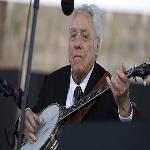Earl Scruggs, whose distinctive style of bluegrass banjo picking influenced countless players and helped to shape the sound of modern country music, died in a Nashville hospital Wednesday, March 28. He was 88 years old.
Before Earl Scruggs, most banjo players used a two- fingered picking style. But all that changed after the 21-year-old North Carolina native joined Bill Monroe's Bluegrass Boys in 1945, and brought his three- fingered rolls to Nashville.
"I used to play with just the finger and thumb, which they call two-fingered style. Then I started playing a tune when I was about 10 or 11 and this third finger started working, which filled in some spaces. And that excited me because I could play some other tunes that I couldn't play with the two finger style. So I just kept working with what I had."
Before Earl Scruggs, the banjo was often considered a novelty item in a band. It was usually played by a comic character, not a serious musician. As fellow banjo player Bela Fleck explains, Earl Scruggs changed all that.
"I think it was a combination of an incredible rhythmic approach with a very simple and beautiful harmonic language," he said. "He plays the banjo and it grabs you just like the lead vocal would. An amazing technique. They called him ‘the Paganini of the banjo' in the New York Times when he played at Carnegie Hall. And I think he was just a beautiful, beautiful player. I think the lessons that you learn from someone like that transcend bluegrass and are just about music."
In 1948, Earl Scruggs and guitarist Lester Flatt shocked the country music community by quitting Bill Monroe's band and setting out on their own. In retrospect, it was a brilliant move, as Flatt and Scruggs and The Foggy Mountain Boys soon became just as famous as their ex-boss. Their first hit, "Foggy Mountain Breakdown," arguably became the most famous banjo instrumental in the world. The song was a favorite of a then- teenaged bluegrass fan named Warren Beatty, who later used it as the theme to his movie "Bonnie and Clyde."
By the time Warren Beatty used their music in "Bonnie and Clyde," Flatt and Scruggs had outgrown the smallish world of bluegrass and had entered the mainstream. They played everywhere: New York's famed Carnegie Hall, college campuses, and even headlined the famous Newport Folk Festival in 1962. The next year, Earl Scruggs' banjo was heard on the number one country song in the U.S., "The Ballad of Jed Clampett," known to fans around the world as the theme to the "Beverly Hillbillies" television program.
Throughout the 1960s Earl Scruggs' sound continued to evolve. He discovered new songs through his sons Randy and Gary, along with musicians like Bob Dylan and Ravi Shankar, who came to Nashville and wanted to meet and pick tunes with the legendary banjo master. In turn, Earl wanted to incorporate songs by Bob Dylan and other folk rockers into the Flatt and Scruggs sound, a move that didn't please Lester Flatt. Nor did he agree with Scruggs' liberal politics. These differences led to the breakup of Flatt & Scruggs in 1969.
The end of that legendary pairing was not, however, the end of Earl Scruggs. He teamed with his sons Steve, Gary and Randy to form the Earl Scruggs Revue, a mainly acoustic rock band that went on to record several albums and influence many groups. Among them was the Nitty Gritty Dirt Band, who credited Earl and his sons for inspiring the groundbreaking project "Will The Circle Be Unbroken."
Earl Scruggs continued to record and perform with the Revue through the 1970s and 1980s. Son Steve's death in 1992 deeply affected him. The loss, along with a serious heart attack four years later, forced him into an early retirement.
The new century, however, brought more music: Fans the world over were thrilled when he released "Earl Scruggs And Friends." The Grammy-winning album featured collaborations with his sons along with Sting, Dwight Yoakam and others.
A member of just about every musical Hall of Fame and a recipient of numerous honors, Earl Scruggs continued to tour until soon before his death. He played in theatres, clubs and major festivals such as Bonnaroo, Stagecoach and last October's Hardly Strictly Bluegrass.
Few musicians have changed the way an instrument is played and heard the way Earl Scruggs has. Today, most everyone who picks a banjo does it "Scruggs style." As the country singer Porter Wagoner said at Scruggs' 80th birthday party, "Earl was to the five-string banjo what Babe Ruth was to baseball."
